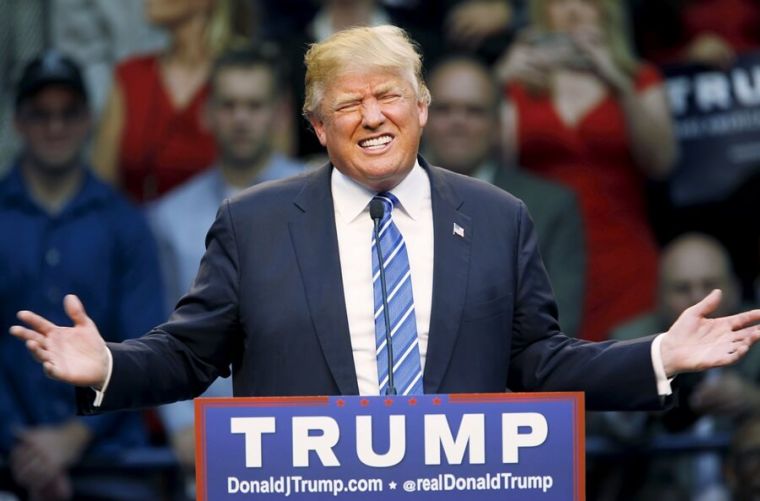Donald Trump: He's not the Messiah, he's a very naughty boy

What does Donald Trump have to do to stop people voting for him?
The latest row over his plans to stop all Muslims entering the US is only the latest in a string of what in other candidates would mean instant electoral extinction. Trump has offended black people (he thinks they're over-reacting to police shooting so many of their young men), Mexicans (he thinks they're rapists and drug dealers, and wants to build a wall to keep them out), women (he said Carly Fiorina was too ugly to vote for), veterans (he said John McCain wasn't a war hero because he got captured) and just about every other group you can think of.
A petition to bar him from the UK has just passed 100,000 signatures, which means that it has to be debated by Parliament. However, his attitude to the backlash about his Muslim plans sums up his attitude to all the other flak he's taken: "I don't care."
But what is it about him that's leading swarms of people – including many evangelical Christians – to say, "Go Trump"? And just how dangerous is he?
Trump scores because he's authentic and passionate. In an age when most candidates have teams of people devoted to making sure that they don't offend people, Trump tells it how he sees it. In the long run, nothing is so damaging to democracy as the sense that some topics are out of bounds and that some ideas are unchallengeable. When debates aren't held in the council chamber they'll be held in the pubs and in the streets – and then on the barricades. The rise of the National Front in France is a direct result of that failure. The extinction of Westminster-based parties in Scotland is because Scots believed they didn't speak for them. Jeremy Corbyn's election to lead the Labour Party was at least in part driven by those voting "none of the above" – that is, the cookie-cutter middle managers who never said one interesting thing between them in the whole of their campaigns. When it's impossible to distinguish between opposing parties, new forces will arise to say "a plague on both your houses".
These new forces can be very, very dark. Trump's rise has come because he's played to the worst instincts of American Republicans. He works on fear, prejudice and ignorance. Yes, some of what he says is because "I don't care" what people think. Much of it is calculated as carefully as any serious presidential contender might do.
That leads to two questions. First, does Trump speak for the majority of Americans? The answer to this is, probably not. He can play his audiences by identifying the issues that genuinely trouble them – terrorism, immigration, unemployment and health – but his actual solutions don't stand up to scrutiny. A ban on Muslims entering the US would be unenforceable, for a start, and would do so much harm to American standing in the world that it would never happen. As for the 2000-mile wall along the Mexican border – "paid for by Mexico", Trump promised – seriously?
So if Trump wins the Republican nomination – and the chances of him being dumped from the approved candidates list are growing by the hour – he would probably lose against any serious Democrat adversary.
The second question, though, is more fundamental. Trump's appeal is that he looks like a leader. He invites people to follow him, not to scrutinise his policies – and that's dangerous. He's campaigning as a messiah, not as a politician with a serious programme for government, and that should concern anyone who cares about the functioning of democracy.
When the prophet Samuel was growing old, the people of Israel came to him and asked him to give them a king instead. He warns them that they'll regret it, because the king will take the best of everything they have, and: "When that day comes, you will cry out for relef from the king you have chosen, and the Lord will not answer you in that day" (1 Samuel 8:18).
The warning was against substituting faith in an ordinary, fallible human being for faith in God. For the latter, read: belief in truth, honesty, fairness, kindness and justice. Trump has said so much to leave his commitment to these values open to question that it's hard to see why any Christian would vote for him.
But that's the appeal of false messiahs: they persuade people that if only they trust them, everything will be alright in the end.
I don't think Donald Trump will be the next US President. But it troubles me to see how close he's coming. I hope and pray that Americans will wake up to their danger in time.
Follow @RevMarkWoods on Twitter.











